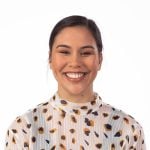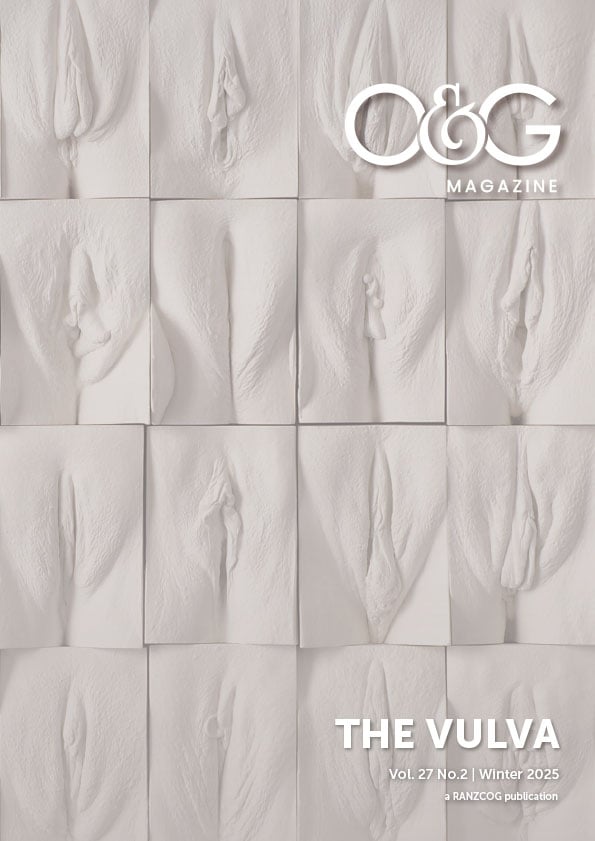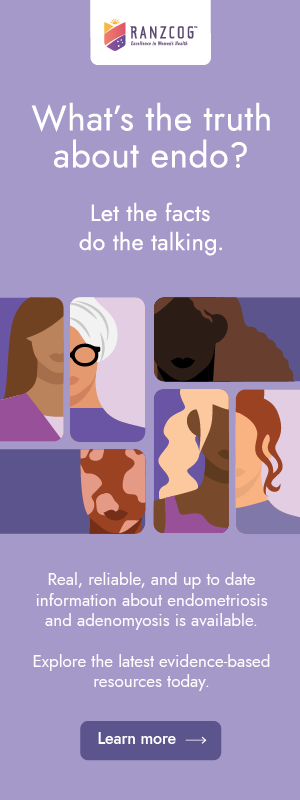As the medical profession increasingly recognises the need for greater diversity in the workforce to address health inequities, particular effort is being made by RANZCOG to encourage and attract Māori to pursue obstetrics and gynaecology (O&G) as their chosen specialty. Medical registration data shows that only 4.7% of practising doctors in Aotearoa New Zealand identify as Māori, despite Māori comprising 17.8% of the national population. Whilst progress has been made over recent years, Māori only comprise 4.4% of O&G specialists.1
Recent research, completed for RANZCOG by Allen + Clarke, offers invaluable insights into the educational journeys of Māori completing medical studies and moving into specialist training, shedding light on the factors that influence their decisions to pursue (or not pursue) a career in O&G, and revealing the good and not so good aspects of their FRANZCOG training experience. The research and recommendations developed provide a guide for RANZCOG to foster a more inclusive and supportive pathway for Māori into and through the FRANZCOG training program, and ultimately to increase the number of Māori in O&G.
Phase one
Goals of RANZCOG’s Te Rautaki Māori me Te Ara Whakamua 2021-2026 include that ‘Māori trainees are supported throughout the training period to be culturally safe, valued, and respected’ and that ‘The Māori O&G workforce grows to reflect the population’. He Hono Wāhine commissioned this research to better understand how Māori experience recruitment and training for the FRANZCOG program. The study aimed to explore Māori doctors’ experiences in applying for FRANZCOG training, as well as the strengths and weaknesses of the program from their perspective. The findings will inform changes to increase Māori participation and improve their training experience.
The research was conducted through in-depth qualitative interviews using a hīkoi (journey) based narrative approach. The study examined individual experiences, medical system structures, and broader societal impacts on Māori trainees.
Findings indicate that Māori are drawn to obstetrics and gynaecology to make a difference for pēpi (baby), wāhine (women), and whānau Māori (family).
Positive role models and informal mentors played a significant role in encouraging their entry into the profession. However, workplace culture significantly influenced their decisions, with experiences of bullying, sexism, and racism deterring some, while supportive environments encouraged others.
I was lucky enough that when I was there the Senior Registrar was Māori, so she kind of took me under her wing.
I have been quite traumatised by that experience, and I do not have the energy now. I got into this to help Māori women and whānau, but I feel like I have failed.
I just wanted to do the speciality so bad. At the end of the day, I want to be an O&G specialist helping Māori women throughout the motu (island), so I just put my head down.
The application process for FRANZCOG training was found to be clear and transparent. However, the interview process lacked alignment with te ao Māori values, particularly in fostering whanaungatanga (relationship, connection). Participants suggested creating more opportunities to emphasise personal values and motivations in interviews.
While trainees found the clinical and academic demands challenging, they were willing to commit the necessary effort. However, they also faced additional pressures, such as cultural loading, being expected to represent Māori perspectives, engaging with Māori patients, and participating in committees. The College’s appointment of a Kaitohutohu Wāhine Māori (Māori Women’s Health Advisor) was seen as a positive step in supporting Māori members of RANZCOG and was also seen as a display of RANZCOG’s commitment to Māori.
Training placements significantly impacted trainees’ experiences. Proximity to whānau and support networks was beneficial, as were placements in smaller hospitals, where supervisors sometimes have more time to engage in training, and the environment was more adaptable to Māori needs. Many reported culturally unsafe environments in larger hospitals, where Western models dominated and te ao Māori practices were undervalued. Some trainees faced racism and bias, including negative attitudes toward cultural birthing practices and resistance to Te Tiriti o Waitangi training. These experiences led to stress, leave-taking, and, in some cases, a change in career path.
“When I first started working, I looked around and there were no Māori doctors… I realised there was only one Māori O&G doctor in (location – redacted to protect participant privacy) and from then I was like ‘I have to do this’.”
“A consultant made me seriously consider O&G. He was really passionate about women’s health. And he also was not trying to force me down this route. He was very frank and said, ‘if you really want to help the Māori community there’s a few specialties you should really consider’.”
Hospital hierarchies made it difficult for trainees to challenge problematic behaviours, given their dependence on senior doctors for assessments. Despite these challenges, many trainees remained committed to the profession, motivated by their ability to make obstetrics and gynaecology more culturally safe for Māori.
Support networks played a crucial role in trainees’ resilience. Connections with senior registrars, Te Ohu Rata o Aotearoa (Te ORA), and RANZCOG’s He Hono Wāhine were valuable. Participants suggested establishing a formal Kaiāwhina (support) role to provide cultural support to Māori trainees.
“I think what’s important is support networks outside of the hospital which make things a lot easier.”
“The opportunity to tutaki (meet), whanaungatanga (connect) and be guided by tuakana (consultants, registrars, prevocational doctors and medical students) who look and sound like me, would have been an asset and I believe this would have helped me navigate medical school and speciality training more confidently. This is important, this is how we decolonise the whakaaro of “imposter syndrome”, we as Māori, are exactly who is needed and what is needed to look after iwi Māori”.
Phase two
While phase one focused on the lived experiences of Māori already connected to RANZCOG, phase two of the research provided valuable insights into the earlier stages of the medical journey. This research aimed to better understand the factors influencing Māori doctors’ decisions around medical specialisation. The study explored what encourages or deters Māori medical students from considering obstetrics and gynaecology as a career and identified opportunities to increase Māori interest and ultimately participation in FRANZCOG training.
The research was conducted through an online survey targeting Māori medical students, prevocational doctors, current trainees, and recently qualified specialists. It focused on key decision points — early interest in medicine at school, and career decision-making during medical education and in the post graduate years. The survey, distributed through Te ORA (Māori Medical Practitioners Association), received 95 responses (54% response rate) from doctors with various medical specialisations.
Many respondents had already developed an interest in medicine during their school years, often due to a strong aptitude for science subjects, the challenge and prestige of the profession, and the desire to improve Māori health outcomes. Personal experiences with the healthcare system, both positive and negative, were also significant motivators.
I was often in hospital myself as a child and I loved seeing and interacting with doctors who appeared friendly and clever. I also observed from a young age that such people were well respected by the adults in my life.
I had the experience of my whānau being unwell and little being done to help them and I knew I wanted to bring about positive change for them
I hadn’t considered doing medical school until a teacher suggested it to me when I said I wanted to be a psychologist, and they suggested psychiatry.
Support from whānau and exposure to Māori doctors played a key role in career aspirations. However, discouragement from teachers and career advisors was a common experience, with some students being steered toward other fields like nursing.
Interest in specific medical specialisations developed through clinical experiences, personal interests, and lifestyle considerations. Factors such as work-life balance, the ability to work in community settings, and the opportunity to contribute to Māori health outcomes influenced decision-making.
Mentorship from Māori doctors and positive clinical placements played a crucial role in guiding career choices. Conversely, negative experiences, including instances of bullying, racism, and inadequate supervision, discouraged some from pursuing particular specialities, including obstetrics and gynaecology.
About one-third of respondents expressed some interest in obstetrics and gynaecology during their medical education. Clinical placements significantly influenced their decisions — both positively and negatively. Positive experiences included hands-on learning and the ability to integrate hauora Māori (Māori health) into practice, while negative experiences, such as workplace bullying and cultural insensitivity, deterred interest.
“I had an attachment in a rural hospital for my O&G placement in which the population was 80% Māori. The care and hands on experience with Māori whānau showed how hauora Māori for wāhine and whānau can be integrated in our Eurocentric health system”.
“If anything, the toxic workplace in O&G pushed me further away from even considering O&G. It was not an enjoyable rotation”.
To encourage Māori participation in the field of medicine, survey respondents highlighted the need for greater exposure to Māori role models, improved mentorship, and culturally safe training environments. Engagement with RANZCOG and O&Gs at conferences and through He Hono Wāhine provided valuable support but would benefit from further expansion.
All it takes is one inspirational SMO at a stand to get you hooked!
By addressing barriers and leveraging existing support structures, the RANZCOG can help ensure more Māori doctors enter and thrive within the field.
The findings from both phase one and phase two of this research provide RANZCOG with recommendations for supporting Māori students and encouraging greater diversity within the specialty of obstetrics and gynaecology. By addressing key issues such as clinical experiences, training placements, visibility of Māori role models, support systems and systemic change, RANZCOG can help build a more inclusive and supportive pathway for Māori.
There are currently more Māori medical students graduating from medical schools, and more Māori FRANZCOG trainees than ever before, meaning we have the opportunity to make significant progress towards a workforce that reflects the population it serves. Through Te Rautaki Māori me te Ara Whakamua, RANZCOG’s He Hono Wāhine will continue supporting growth of Māori O&Gs. The overriding message from the research is that we can all play a key role in fostering Māori representation in obstetrics and gynaecology by fostering culturally safe learning environments, strengthening mentorship networks, and engaging early and positively with Māori medical students and post-graduate doctors. The research powerfully showed that it can be the support or role-modelling of one individual, Māori or non-Māori, that makes the difference and inspires a future Māori O&G.
“I was encouraged at [hospital] when I went there. I was well mentored and looked after by that department. I loved the work, the emergency, and the birthing moment is a real privilege as well.”
On behalf of RANZCOG and He Hono Wāhine, we thank the Fellows, trainees and other Māori doctors who generously and bravely shared their experiences, to allow us to learn and improve for future trainees, and ultimately wāhine and whanau Māori.
References
- Our Data, MCNZ






Leave a Reply